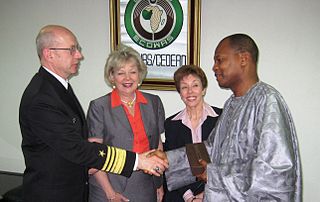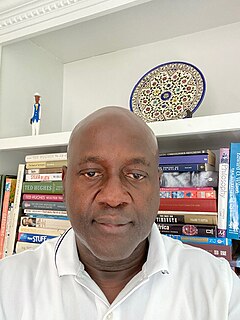Related Research Articles

President Léopold Senghor advocated close relations with France and negotiation and compromise as the best means of resolving international differences. To a large extent, the two succeeding presidents have carried on Senghor's policies and philosophies. Senegal has long supported functional integration among French-speaking West African states through the West African Economic and Monetary Union.

The Economic Community of West African States, also known as ECOWAS, is a regional political and economic union of fifteen countries located in West Africa. Collectively, these countries comprise an area of 5,114,162 km2 (1,974,589 sq mi), and in 2015 had an estimated population of over 349 million.

Mariama Bâ was a Senegalese author and feminist, whose French-language novels were both translated into more than a dozen languages. Born in Dakar, she was raised a Muslim.

Mohamed Ibn Chambas is a lawyer, diplomat, politician and academic from Ghana who has served as an international civil servant since 2006. He is currently the United Nations Special Representative of the Secretary-General for West Africa and the Sahel, and head of UNOWAS. Previously, he served as the UN SRSG and Head of the Joint UN-AU Peacekeeping Mission in Darfur (2012-2014), the Secretary-General of the African, Caribbean and Pacific Group of States (2010-2012) and the President of the Economic Community of West African States.
Omolara Ogundipe-Leslie, also known as Molara Ogundipe, was a Nigerian poet, critic, editor, feminist and activist. Considered one of the foremost writers on African feminism, gender studies and literary theory, she was a social critic who came to be recognized as a viable authority on African women among black feminists and feminists in general. She contributed the piece "Not Spinning on the Axis of Maleness" to the 1984 anthology Sisterhood Is Global: The International Women's Movement Anthology, edited by Robin Morgan. She is most celebrated for coining the term STIWA or Social Transformation in Africa Including Women.
Femi Euba is a Nigerian actor, writer and dramatist, who has published numerous works of drama, theory and fiction. As a theatre practitioner his work encompasses acting, playwriting and directing. Among the topics of his plays is Yoruba culture.

The Institute of Development Studies (IDS) is an institution for development research, teaching and learning, and impact and communications, based at the University of Sussex. It is ranked first in the world for development studies in the 2020 edition of the QS World University Rankings and is consistently ranked among the world's top development research centres.

Abdou Kolley is a Gambian economist and politician who was Gambian Minister of Finance and Economic Affairs. He has held several roles in the Cabinet of the Gambia, having previously served as Minister of Finance and Economic Affairs and Minister of Trade, Industry, Regional Integration and Employment several times, as well as Minister of Fisheries and Water Resources.
Sylvia Chant was a British academic who was professor of Development Geography at the London School of Economics and Political Science and was co-director of the MSc Urbanisation and Development Programme in the LSE's Department of Geography and Environment.

The Twa are a group of indigenous African Pygmy tribes.

Martha Chen is an American academic, scholar and social worker, who is presently a Lecturer in Public Policy at the Harvard Kennedy School and Senior Advisor of the global research-policy-action network WIEGO and a member of the Advisory Board of the United Nations University World Institute for Development Economics Research (UNU-WIDER) . Martha is a development practitioner and scholar who has worked with the working poor in India, South Asia, and around the world. Her areas of specialization are employment, poverty alleviation, informal economy, and gender. She lived in Bangladesh working with BRAC, one of the world's largest non-governmental organizations, and in India, as field representative of Oxfam America for India and Bangladesh for 15 years.

Wanjiku Kabira is an associate professor of literature at the University of Nairobi, Kenya. She has specialized in the fields of Oral literature, African-American literature and Caribbean literature. She has been actively involved in women affairs and in gender issues. Wanjiku has served as in various capacities notably as a. Vice-Chair in the Kenya Constitutional Review Process (2000-2005) b. Chair Person Women Political Alliance (2002-2011) c. Director Collaborative Center for Gender and Development (1995-2009) d. Chair, Department of Literature, University of Nairobi

Hassoum Ceesay is a Gambian historian, writer and museum curator at the Gambia National Museum. He is one of the most prolific Gambian historians.

Tijan M. Sallah is a Gambian poet, short story writer, biographer and economist at the World Bank.

A constitutional crisis in the Gambia started after the presidential elections on 1 December 2016, and ended with the outgoing president Yahya Jammeh being forced to step down in favour of his elected successor Adama Barrow on 21 January 2017, after resistance.

The ECOWAS military intervention in the Gambia or the ECOWAS Mission in The Gambia – code-named Operation Restore Democracy – is an ongoing military intervention in the Gambia by several West African countries. The intervention was launched to resolve a breakdown of internal order in the government of the Gambia that resulted from a dispute over the country's presidency. The dispute had led to a constitutional crisis in the country. The intervention began in January 2017, and in June 2017, the term of the ECOWAS military mission was extended by a year. The mission is ongoing as of August 2020, and is expected to continue through at least 2021.
In 2011, the Economic Community of West African States (ECOWAS) adopted a Policy on Science and Technology (ECOPOST).
Geraldine Heng is an Associate Professor of English and Comparative Literature and Perceval Fellow, with a joint appointment in Middle Eastern studies and Women’s studies, at the University of Texas at Austin. She is noted as a key figure in the development of postcolonial approaches to the European Middle Ages. Her book The Invention of Race in the European Middle Ages (2018) won the Association of American Publishers subject category award for world history.
Ada Uzoamaka Azodo is a literary scholar. She is Associate Faculty in the Humanities, and Adjunct Professor of African, African American and African Diaspora Studies at Indiana University Northwest.
References
- ↑ Jagne, The city in African literature : the rural-urban contradiction and the individual vs. the communal ethic. MA thesis, Cornell University, 1989.
- ↑ Jagne, African women and the category 'woman': through the works of Mariama Bâ and Bessie Head. PhD thesis, State University of New York at Binghamton, 1994.
- ↑ James Karuhanga, Networking initiative connecting 50m women entrepreneurs to take off in Kigali, The New Times , 23 November 2019. Accessed 12 August 2020.
- ↑ Victoria Ojeme, 292,141 Nigeria Refugees seek asylum in Niger, Cameroon, Chad – UNHRC, Vangard , 18 June 2020. Accessed 12 August 2020.